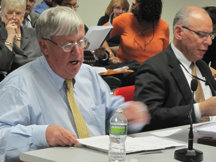Although the Hudson County freeholders say they are determined to cut spending and increase revenue, the 2011 Fiscal Year $480 million budget introduced at the May 11 freeholder caucus pretty much reflects the tough economic times, said Hudson County Executive Tom DeGise.
The tax levy will rise by 4.57 percent to $281.65 million. This is an increase of approximately $12.3 million over 2010, DeGise said.
“The tax rate will rise from $4.10 to $4.64 per $1,000 of equalized value. But this is only our third tax rate increase in eight years,” DeGise noted.
Thus, the owner of $200,000 of property would pay another $108 in county taxes per year.
“This budget, like all of our past budgets, contains no one-shot revenues or ‘creative’ accounting.” – Bill O’Dea
____________
“Hudson County continues to endure aftershocks from the financial earthquake of 2008 to 2009,” DeGise said.
This has caused the equalized valuation of all properties within the county’s 12 municipalities to significantly decline again this year. The total amount of decline was $4.75 billion, a loss of more than 7 percent.
Revenues that were derived from a once-robust property market continue to fall. DeGise also said that fees from the County Register’s Office continue to decline, as do returns from interest on investments.
“As I have said in past presentations, every budget is essentially a plan of action, a reflection of choices,” DeGise told the freeholders. “This plan, and the tough choices it calls for, is a product of the very difficult economic conditions we face locally in the wake of the long recession and the still fragile recovery now underway.”
This budget cycle also faces new state imposed spending caps – or limits – that previous budgets did not, including a limit on how much they can raise taxes.
“Beginning this budget cycle, the state has imposed another cap law on counties known as the 2010 Levy Cap, which limits to 2 percent the amount that the levy may be raised outside special exemption areas of the budget,” DeGise said. “This new cap does not supersede the previous 2.5 percent cap. Instead, the county must calculate employing both caps and must abide by whichever cap yields the lower tax levy. These caps have different exemptions and thus yield different numbers.”
Worse for this year’s budget is the fact that the county expended its entire cap bank to allow for spending increases in 2009 and 2010 budgets. Under state law, local governments that spend less than the cap allowed amount in one year can use this as a credit for the next two budget years, and thus spend more than the allowable cap.
“As in years past, we were determined to avoid gimmicks,” DeGise said. “This budget, like all of our past budgets, contains no one-shot revenues, or ‘creative’ accounting.”
Labor is one of the biggest costs, including necessary employees in areas like county social services.
“Because county government is so labor intensive, with much of our workforce in state or federally mandated roles in corrections, court security, and social services, we continue the ongoing process of engaging our workforce to seek savings in order to avoid having to make deep reductions in other areas that would seriously affect our ability to serve the public in such areas as parks and senior services,” DeGise said.
To cut costs, the county has offered incentives for employees who are covered under other insurance plans to give up their county coverage, and for non-union employees to contribute to a portion of their insurance premiums at the same rate the state now requires union employees to do. The county is also holding the line on salary increases, DeGise said.
“The goal is to make the workforce less expensive,” he said. “Overall, the salaries and wages line in this budget will rise just 0.6 percent this year.”
This is rising only because of contractual increases from past negotiations.
“We will continue to seek reductions in our overall workforce through a managed attrition program,” he said. “But wages are only one part of our labor costs. Health and pension benefit obligations continue to rise at double-digit rates. Nearly three quarters of what we will ask for as an increase in the levy are tied to costs that are mandated obligations we must meet.”
Freeholder Chairman Bill O’Dea said the freeholders will have budget reviews with each department over the next six weeks to see how to cut the budget.
Weehawken sees biggest impact
Communities divide up the increase based on assessed values in each community. Of the $12 million overall increase in taxes needed to be raised this year, Weehawken will see the largest impact, paying about $1.5 million more than it did last year. Only Harrison will see a reduction if the budget is passed as introduced.
A public hearing on the budget will be held on June 24 in the Hudson County Annex Building at 6 p.m.
Al Sullivan may be reached at asullivan@hudsonreporter.com.
